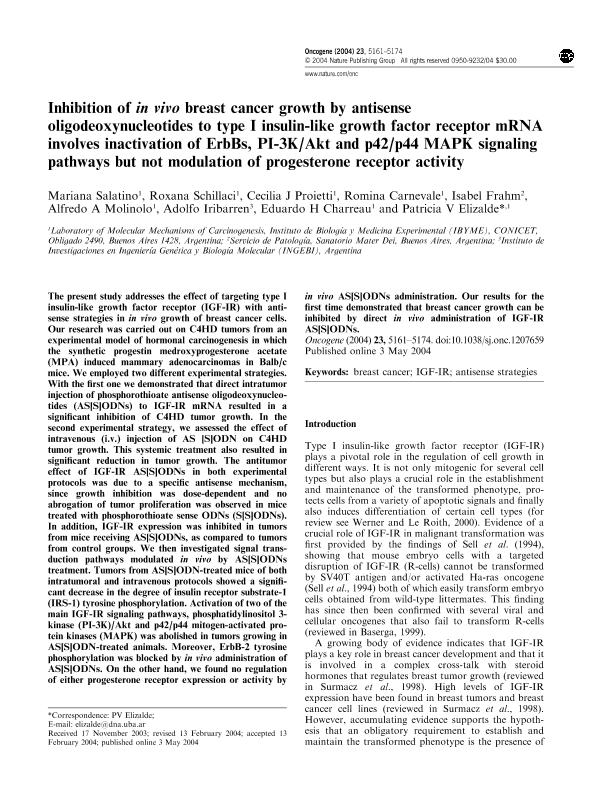Artículo
Inhibition Of in vivo breast cancer growth by antisense oligodeoxynucleotides to type I insulin-like growth factor receptor mRNA involves inactivation of ErbBs, PI-3K/Akt and p42/p44 MAPK signaling pathways but not modulation of progesterone receptor a
Salatino, Mariana ; Schillaci, Roxana
; Schillaci, Roxana ; Proietti Anastasi, Cecilia Jazmín
; Proietti Anastasi, Cecilia Jazmín ; Carnevale, Romina Paula
; Carnevale, Romina Paula ; Frahm, Isabel; Molinolo, Alfredo; Iribarren, Adolfo Marcelo
; Frahm, Isabel; Molinolo, Alfredo; Iribarren, Adolfo Marcelo ; Charreau, Eduardo Hernan
; Charreau, Eduardo Hernan ; Elizalde, Patricia Virginia
; Elizalde, Patricia Virginia
 ; Schillaci, Roxana
; Schillaci, Roxana ; Proietti Anastasi, Cecilia Jazmín
; Proietti Anastasi, Cecilia Jazmín ; Carnevale, Romina Paula
; Carnevale, Romina Paula ; Frahm, Isabel; Molinolo, Alfredo; Iribarren, Adolfo Marcelo
; Frahm, Isabel; Molinolo, Alfredo; Iribarren, Adolfo Marcelo ; Charreau, Eduardo Hernan
; Charreau, Eduardo Hernan ; Elizalde, Patricia Virginia
; Elizalde, Patricia Virginia
Fecha de publicación:
01/07/2004
Editorial:
Nature Publishing Group
Revista:
Oncogene
ISSN:
0950-9232
e-ISSN:
1476-5594
Idioma:
Inglés
Tipo de recurso:
Artículo publicado
Clasificación temática:
Resumen
The present study addresses the effect of targeting type I insulin-like growth factor receptor (IGF-IR) with antisense strategies in in vivo growth of breast cancer cells. Our research was carried out on C4HD tumors from an experimental model of hormonal carcinogenesis in which the synthetic progestin medroxyprogesterone acetate (MPA) induced mammary adenocarcinomas in Balb/c mice. We employed two different experimental strategies. With the first one we demonstrated that direct intratumor injection of phosphorothioate antisense oligodeoxynucleotides (AS[S]ODNs) to IGF-IR mRNA resulted in a significant inhibition of C4HD tumor growth. In the second experimental strategy, we assessed the effect of intravenous (i.v.) injection of AS [S]ODN on C4HD tumor growth. This systemic treatment also resulted in significant reduction in tumor growth. The antitumor effect of IGF-IR AS[S]ODNs in both experimental protocols was due to a specific antisense mechanism, since growth inhibition was dose-dependent and no abrogation of tumor proliferation was observed in mice treated with phosphorothioate sense ODNs (S[S]ODNs). In addition, IGF-IR expression was inhibited in tumors from mice receiving AS[S]ODNs, as compared to tumors from control groups. We then investigated signal transduction pathways modulated in vivo by AS[S]ODNs treatment. Tumors from AS[S]ODN-treated mice of both intratumoral and intravenous protocols showed a significant decrease in the degree of insulin receptor substrate-1 (IRS-1) tyrosine phosphorylation. Activation of two of the main IGF-IR signaling pathways, phosphatidylinositol 3-kinase (PI-3K)/Akt and p42/p44 mitogen-activated protein kinases (MAPK) was abolished in tumors growing in AS[S]ODN-treated animals. Moreover, ErbB-2 tyrosine phosphorylation was blocked by in vivo administration of AS[S]ODNs. On the other hand, we found no regulation of either progesterone receptor expression or activity by in vivo AS[S]ODNs administration. Our results for the first time demonstrated that breast cancer growth can be inhibited by direct in vivo administration of IGF-IR AS[S]ODNs.
Archivos asociados
Licencia
Identificadores
Colecciones
Articulos(IBYME)
Articulos de INST.DE BIOLOGIA Y MEDICINA EXPERIMENTAL (I)
Articulos de INST.DE BIOLOGIA Y MEDICINA EXPERIMENTAL (I)
Articulos(INGEBI)
Articulos de INST.DE INVEST.EN ING.GENETICA Y BIOL.MOLECULAR "DR. HECTOR N TORRES"
Articulos de INST.DE INVEST.EN ING.GENETICA Y BIOL.MOLECULAR "DR. HECTOR N TORRES"
Citación
Salatino, Mariana; Schillaci, Roxana; Proietti Anastasi, Cecilia Jazmín; Carnevale, Romina Paula; Frahm, Isabel; et al.; Inhibition Of in vivo breast cancer growth by antisense oligodeoxynucleotides to type I insulin-like growth factor receptor mRNA involves inactivation of ErbBs, PI-3K/Akt and p42/p44 MAPK signaling pathways but not modulation of progesterone receptor a; Nature Publishing Group; Oncogene; 23; 30; 1-7-2004; 5161-5174
Compartir
Altmétricas



